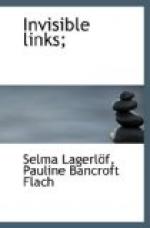So little Ruster had to drive from house to house in the blinding snow. His wet moustache hung limply down over his mouth; his eyes were bloodshot and blurred, but the brandy was blown out of his brain. He began to wonder and to be amazed. Was it possible, was it possible that no one wished to receive him?
Then all at once he saw himself. He saw how miserable and degraded he was, and he understood that he was odious to people. “It is the end of me,” he thought. “No more copying of music, no more flute-playing. No one on earth needs me; no one has compassion on me.”
The storm whirled and played, tore apart the drifts and piled them up again, took a pillar of snow in its arms and danced out into the plain, lifted one flake up to the clouds and chased another down into a ditch. “It is so, it is so,” said little Ruster; “while one dances and whirls it is play, but when one must be buried in the drift and forgotten, it is sorrow and grief.” But down they all have to go, and now it was his turn. To think that he had now come to the end!
He no longer asked where the man was driving him; he thought that he was driving in the land of death.
Little Ruster made no offerings to the gods that night. He did not curse flute-playing or the life of a pensioner; he did not think that it had been better for him if he had ploughed the earth or sewn shoes. But he mourned that he was now a worn-out instrument, which pleasure could no longer use. He complained of no one, for he knew that when the horn is cracked and the guitar will not stay in tune, they must go. He became all at once a very humble man. He understood that it was the end of him, on this Christmas Eve. Hunger and cold would destroy him, for he understood nothing, was good for nothing and had no friends.
The sledge stops, and suddenly it is light about him, and he hears friendly voices, and there is some one who is helping him into a warm room, and some one who is pouring warm tea into him. His coat is pulled off him, and several people cry that he is welcome, and warm hands rub life into his benumbed fingers.
He was so confused by it all that he did not come to his senses for nearly a quarter of an hour. He could not possibly comprehend that he had come back to Loefdala. He had not been at all conscious that the stable-boy had grown tired of driving about in the storm and had turned home.
Nor did he understand why he was now so well received in Liljekrona’s house. He could not know that Liljekrona’s wife understood what a weary journey he had made that Christmas Eve, when he had been turned away from every door where he had knocked. She felt such compassion on him that she forgot her own troubles.
Liljekrona went on with the wild playing up in his room; he did not know that Ruster had come. The latter sat meanwhile in the dining-room with the wife and the children. The servants, who used also to be there on Christmas Eve, had moved out into the kitchen away from their mistress’s trouble.




